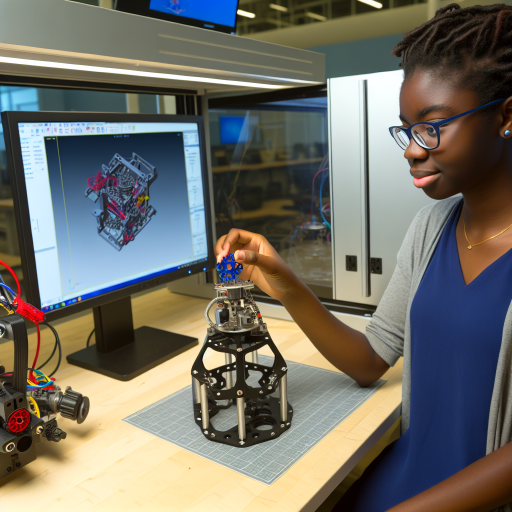Introduction to Petroleum Engineering and Its Traditional Role in Energy Production
Petroleum engineering focuses on the exploration and production of oil and gas resources.
This discipline has played a critical role in shaping the global energy landscape.
Historically, petroleum engineers have driven advancements in extraction technologies.
They have developed techniques to maximize recovery from oil and gas reservoirs.
In essence, their work supports energy security and economic growth worldwide.
Key Responsibilities of Petroleum Engineers
Petroleum engineers assess potential drilling sites.
They analyze geological data to determine where to drill.
Through simulations, they predict future production rates.
Their expertise is vital for designing drilling plans and operations.
Additionally, they work on managing environmental impacts during extraction.
Technological Innovations
Pumping technologies have evolved significantly over the years.
New methods like hydraulic fracturing and horizontal drilling have emerged.
These advancements enable access to previously unreachable reserves.
Additionally, engineering skills are crucial for maintaining aging infrastructure.
Collaboration with Cross-Disciplinary Teams
Pertoleum engineers often collaborate with geologists and environmental scientists.
This teamwork ensures a comprehensive approach to resource management.
Such partnerships enhance understanding of subsurface conditions.
They also promote the development of best practices for sustainability.
Impact on the Energy Sector
Petroleum engineers have significantly contributed to energy production efficiency.
They maximize resource recovery while minimizing costs.
Consequently, their efforts play a role in stabilizing energy prices globally.
As energy demands rise, their skills remain critically important.
Future Challenges
The industry faces numerous challenges including fluctuating market demands.
Regulatory pressures and environmental concerns also pose obstacles.
Petroleum engineers must innovate solutions to these pressing issues.
Unlock Your Career Potential
Visualize a clear path to success with our tailored Career Consulting service. Personalized insights in just 1-3 days.
Get StartedSustainable practices become increasingly essential as fossil fuel reliance evolves.
Emerging Trends in Sustainable Energy: The Need for Change in Petroleum Engineering
Understanding the Shift Towards Sustainable Energy
Global energy demands are shifting towards sustainability.
Renewable energy sources are gaining significant traction.
Consequently, petroleum engineers must adapt to these trends.
They are now tasked with innovating traditional practices.
This shift is essential for reducing carbon footprints.
Role of Petroleum Engineers in Renewable Energy
Petroleum engineers play a vital role in energy transition.
They are developing technology to integrate renewable sources.
For instance, biogas production enhances fuel sustainability.
Additionally, they explore carbon capture and storage techniques.
These practices help mitigate environmental impacts effectively.
Integration of Sustainability in Petroleum Engineering Practices
Modern petroleum engineering focuses on sustainable extraction methods.
Engineers are now implementing advanced drilling technologies.
These technologies minimize harm to the environment.
Moreover, they optimize resource extraction efficiency.
Such methods can extend the lifespan of existing resources.
Collaboration with Other Fields
Cross-disciplinary collaboration is increasingly important.
Petroleum engineers are working with environmental scientists.
They share insights on managing ecological impacts.
Furthermore, partnerships with technology firms promote innovation.
This synergy accelerates the development of sustainable solutions.
The Future of Petroleum Engineering in a Sustainable World
The future landscape of petroleum engineering is evolving.
Engineers must embrace new technologies and methodologies.
Investment in renewable energy projects is crucial.
Continuous learning and adaptation will drive success.
Ultimately, the goal is to balance energy demands with environmental stewardship.
The Role of Petroleum Engineers in Carbon Capture and Storage Technologies
Understanding Carbon Capture and Storage
Carbon capture and storage (CCS) technologies aim to reduce greenhouse gas emissions.
These technologies capture carbon dioxide from industrial processes and energy production.
Once captured, the CO2 is transported and stored underground in geological formations.
The Contribution of Petroleum Engineers
Petroleum engineers play a vital role in developing efficient CCS solutions.
They possess expertise in fluid dynamics and reservoir management.
This knowledge allows them to assess suitable sites for CO2 storage.
Plus, they can optimize injection techniques to improve storage efficiency.
Site Selection and Assessment
Choosing the right site for CO2 storage is critical.
Engineers conduct geological surveys to identify suitable formations.
They evaluate the integrity and capacity of reservoirs to ensure safety.
This process involves analyzing rock properties and fluid behavior.
Injection Techniques
Petroleum engineers design injection processes for CO2 disposal.
They select the correct pressure and temperature for optimal storage.
Additionally, they monitor the injection to prevent leaks and ensure stability.
Monitoring and Verification
Continuous monitoring of CO2 storage sites is essential for safety and effectiveness.
Engineers implement various technologies to track the movement of CO2 underground.
This includes using sensors and advanced imaging techniques.
Regular assessments help in verifying that CO2 remains securely stored.
Collaboration Across Industries
Petroleum engineers often collaborate with environmental scientists and policymakers.
This teamwork enhances the development of sustainable CCS practices.
Together, they create regulations and guidelines for safe CO2 storage.
This multidisciplinary approach ensures that CCS projects are both effective and compliant.
See Related Content: Career Growth Opportunities for Mechatronics Engineers
Innovations by Petroleum Engineers in Hydrocarbon Recovery with Reduced Environmental Impact
Advancements in Technology
Petroleum engineers have embraced innovative technologies to enhance hydrocarbon recovery.
They utilize advanced drilling techniques that minimize surface disruption.
Moreover, new extraction methods reduce the carbon footprint significantly.
For instance, horizontal drilling allows access to resources without extensive land disturbance.
This approach not only increases efficiency but also lessens environmental impact.
Enhancing Efficiency through Data Analytics
Data analytics plays a crucial role in optimizing recovery processes.
Engineers analyze geological data to improve drilling accuracy.
Additionally, predictive modeling helps assess reservoir behavior over time.
This enables companies to make informed decisions that minimize waste.
Overall, enhanced efficiency leads to lower emissions during operations.
Reducing Water Usage
Water conservation is another critical focus for petroleum engineers.
They develop techniques to reduce water consumption in extraction processes.
For example, using recycled water minimizes the need for fresh water sources.
This practice not only conserves vital resources but also reduces environmental stress.
Furthermore, engineers aim to treat and reuse wastewater effectively.
Partnerships with Environmental Organizations
Collaboration with environmental organizations fosters sustainable practices.
Petroleum engineers partner with groups to share insights and technologies.
These partnerships aim to establish best practices for reducing environmental footprints.
Moreover, they promote transparency in operations, building public trust.
Such initiatives encourage sustainable resource management across the industry.
Investing in Renewable Energy Research
Petroleum engineers are increasingly investing in renewable energy initiatives.
They explore opportunities to integrate renewables with traditional hydrocarbon operations.
This includes research into biofuels and carbon capture technologies.
Innovations in these areas can lead to more sustainable energy production.
Additionally, diversifying energy portfolios helps mitigate climate change effects.
Gain More Insights: Key Skills Needed to Succeed as a Chemical Engineer
The Transition from Fossil Fuels
Adaptation of Petroleum Engineers
Petroleum engineers play a crucial role in energy transition.
They leverage their expertise to explore renewable energy sources.
Many engineers now focus on biofuels and solar energy technologies.
For instance, companies like GreenWave Energy are leading the charge.
They integrate traditional skills with innovative approaches.
Innovative Techniques and Technologies
Engineers develop technologies that enhance energy efficiency.
Utilizing data analytics, they optimize energy production processes.
Moreover, they implement sustainable practices across oil and gas sectors.
Techniques such as carbon capture and storage are on the rise.
This method mitigates greenhouse gas emissions significantly.
Collaboration with Renewable Energy Sectors
Collaboration is critical in this evolving landscape.
Petroleum engineers partner with renewable energy firms.
This collective effort strengthens the transition process.
Companies like SolarPlus actively seek collaborations in this arena.
They aim to combine expertise for innovative solutions.
Future Opportunities for Petroleum Engineers
As the market shifts, new roles are emerging for engineers.
The demand for skilled professionals in renewables continues to grow.
Positions in energy management and sustainability are becoming popular.
Petroleum engineers have unique skills that are highly transferable.
This adaptability opens doors to various career possibilities.
Uncover the Details: Career Pathways in Aerospace Engineering

Petroleum Engineers and the Development of Biofuels and Alternative Energy Solutions
Role in Biofuel Research
Petroleum engineers are vital in advancing biofuel technologies.
They apply their expertise in energy production to develop sustainable alternatives.
Through research, engineers identify the best feedstocks for biofuel production.
For example, sugarcane and waste products show promise for ethanol production.
Furthermore, engineers optimize conversion processes for efficiency.
Collaboration with Multidisciplinary Teams
Working alongside chemists and agronomists is essential for petroleum engineers.
This collaboration enhances the development of innovative biofuels.
Petroleum engineers provide insights into extraction techniques and processing methods.
In addition, they assist in scaling up successful lab experiments to commercial production.
Investment in Renewable Energy Projects
Petroleum engineers play a key role in renewable energy investments.
They evaluate potential projects for feasibility and profitability.
This evaluation helps secure funding and resources for new initiatives.
Additionally, engineers project long-term impacts on energy markets.
Impact on Policy and Regulation
Petroleum engineers influence energy policy through expert advice.
They contribute to discussions on regulations promoting biofuels.
By doing so, they help shape a sustainable energy future.
Moreover, their technical knowledge aids in setting realistic environmental standards.
Innovations in Energy Solutions
Innovation is at the heart of petroleum engineering’s role in sustainability.
Engineers explore new technologies like algae-based fuels and hydrogen production.
These innovations extend the array of sustainable energy solutions available.
Consequently, they help reduce reliance on fossil fuels and lower emissions.
See Related Content: Key Responsibilities of a Metallurgical Engineer
Collaboration Between Petroleum Engineers and Environmental Scientists for Sustainable Practices
Importance of Interdisciplinary Collaboration
Petroleum engineers and environmental scientists play vital roles in energy sustainability.
Collaboration enhances the research and development of clean energy solutions.
Both fields must work together to address climate change challenges.
They share knowledge to develop innovative technologies and practices.
Joint Research Initiatives
Research initiatives benefit immensely from a multidisciplinary approach.
Petroleum engineers contribute expertise in resource extraction techniques.
Environmental scientists provide insights into ecological impacts and mitigation strategies.
Joint studies help identify best practices for reducing environmental footprints.
Technological Innovations
Collaboration fosters the development of advanced technologies in energy extraction.
New methods minimize emissions and improve efficiency during oil production.
Innovations include carbon capture and storage techniques.
These technologies are crucial for reducing greenhouse gas emissions.
Regulatory Frameworks and Compliance
Petroleum engineers must adhere to environmental regulations.
Close cooperation helps companies meet compliance standards effectively.
Environmental scientists assist in understanding regulatory requirements.
Together, they ensure that operations do not harm local ecosystems.
Training and Education
Interdisciplinary training programs enhance workforce preparedness.
Future engineers should learn about environmental sustainability principles.
Similarly, environmental scientists need insight into petroleum engineering practices.
These educational efforts build a new generation of eco-conscious professionals.
Community Engagement
Community engagement is crucial for sustainable energy practices.
Collaboration can help address public concerns about environmental impacts.
Petroleum engineers can promote transparency in operations.
Environmental scientists can aid in communicating risks and benefits.
Future Outlook: The Evolving Role of Petroleum Engineers in a Renewable Energy Economy
Transitioning Skills for New Challenges
Petroleum engineers possess essential skills adaptable to renewable energy industries.
They excel in resource management, project planning, and technical designs.
This expertise can enhance energy efficiency and reduce waste in renewable projects.
Additionally, they can guide companies in integrating traditional and renewable practices.
Innovating Energy Solutions
Petroleum engineers are increasingly involved in developing innovative energy solutions.
For instance, they contribute to biofuel production through process optimization.
Moreover, their experience in extraction techniques is invaluable for geothermal energy projects.
They can also aid in designing carbon capture and storage systems to mitigate emissions.
Collaboration Across Industries
Future energy sectors require collaboration among various engineering disciplines.
Petroleum engineers can bridge gaps between fossil fuel and renewable energy industries.
They should work alongside chemists, environmental scientists, and renewable energy experts.
This multidisciplinary approach fosters creative solutions to complex energy challenges.
Continuous Learning and Adaptability
Continuous education will be crucial for petroleum engineers in a renewable landscape.
They must stay updated with the latest technologies and sustainable practices.
Participating in workshops and training programs will enhance their skill sets.
Ultimately, adaptability will be key in navigating the energy transition effectively.
Addressing Climate Change
Petroleum engineers play a vital role in addressing climate change challenges.
They can utilize data analytics to improve energy efficiency in existing systems.
Furthermore, they can develop strategies for reducing the environmental impact of oil production.
By embracing sustainability, they contribute significantly to global climate goals.




